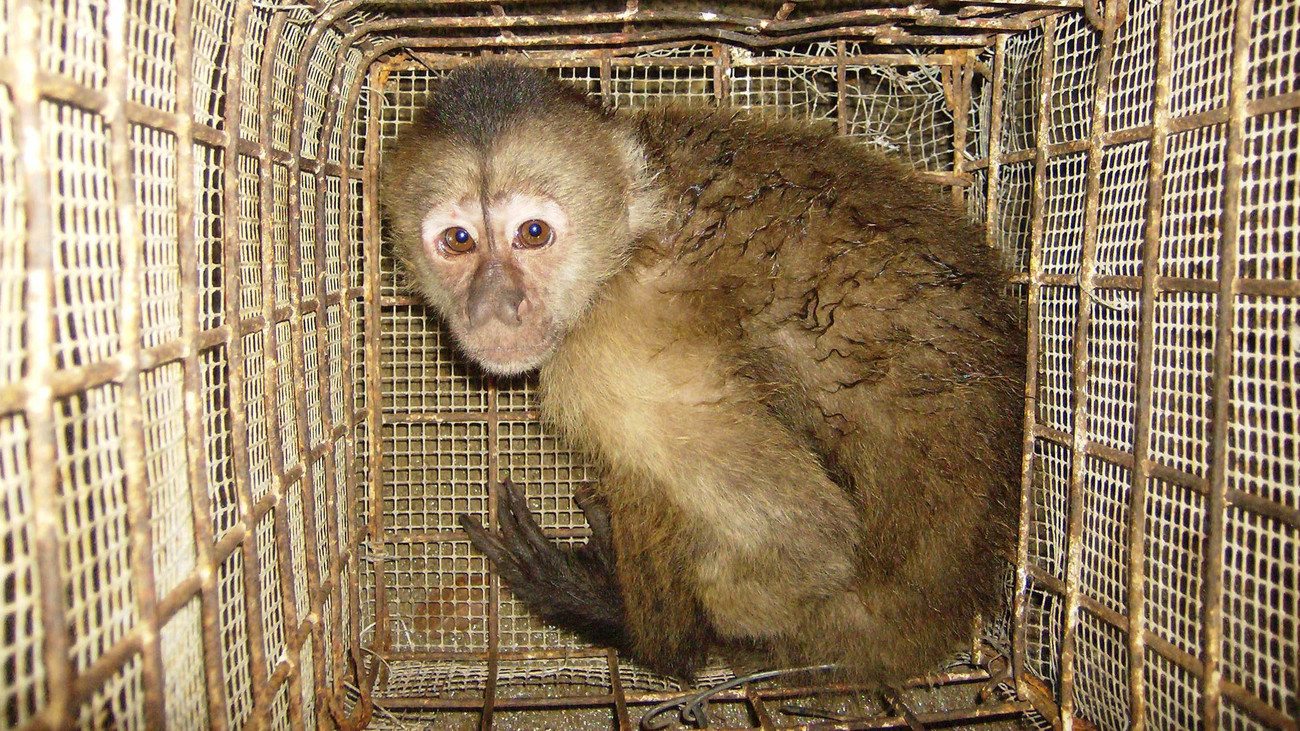the end of a lifetime of lockdown for primates as pets in the UK?
the end of a lifetime of lockdown for primates as pets in the UK?

Most of us who have travelled overseas will have come across people keeping primates as pets during our lives; often on a tropical island, usually chained to a post at a restaurant or a bar or alongside a street performer. Some will have even experienced the old cliché of ‘the Organ Grinder and the Monkey’ in their lifetime. What many won’t know is that there are more than 5,000 primates being kept in captivity outside of zoos in the UK. This is a startling number with marmosets the most common primate pet, and capuchins, squirrel monkeys, lemurs and tamarins also common. IFAW opposes the keeping of primates as pets as life as a pet can never fulfil the needs of these highly intelligent and social animals.
Protecting primates from the cruelty of trade and captivity
The UK Government has launched a consultation on a proposal to ban the keeping of primates as pets in England and this is something IFAW would very much like to see happen. During this consultation period, the public can have their say on the proposal to ‘restrict breeding, acquiring, buying, gifting, selling or otherwise transferring primates, apart from to person licensed to keep primates to zoo standards’.
Our extensive experience in tackling wildlife trade around the globe has demonstrated that scores of animals are taken from the wild to feed such trade, often with up to 90% of animals dying in transit as they are transported or smuggled, resulting in up to 10 times the number of animals being taken from the wild to provide a single animal as a pet. Conditions at capture are terrible, often with adults killed in front of the babies, which are then transported in appalling conditions, deeply traumatised by the experience if they survive it. Often the suffering continues as even the most well-meaning new owners struggle to handle these animals. Captive breeding or farming of primates to supply the pet trade often takes place in very poor conditions and without adequate veterinary care. IFAW believes there are simply no good or appropriate ways to trade such wildlife.
Understanding and respecting primates' needs
Primates are our closest relatives in the animal kingdom and like us have complicated welfare needs. They have varied diets, complex social structures, need a stimulating and open environment and lots of warmth and light. A recent call for evidence by the UK Government found these needs cannot be met in the domestic environment. If these needs aren’t met then these animals, by default, suffer. They live miserable lives, cut off from their social networks, intellectual stimulation and comfort and instead find themselves poorly fed, often cold and bored. It is no wonder that many owners find these creatures aggressive and hard to handle as they grow; this is not necessarily a trait of the species but an outcome of the conditions they find themselves in. It is also no wonder that specialist rescue facilities such as Monkey World in Dorset have waiting lists of primates that owners want to give up.
In short primates as pets live miserable lives, becoming depressed in the same manner humans would if we suffered in this way. When we think of the mental toll of lockdown on many individuals of the human species in 2020, this is a mere snapshot of similar experiences that primates face as pets in the UK. They endure the equivalent of a lifetime of lockdown without the basic requirements that would enable them to be healthy or content.
The proposed ban would make the keeping of a primate as a pet an offence in England and this is a piece of legislation that is badly needed and long overdue. As the UK moves towards defining a new role for itself in a changing political landscape, this proposal is a way in which the Government can lead and start to develop a platform of best practice that shows the UK as a country with forward thinking and civilised approaches to the way it treats animals.
I would encourage all to take a stand for primates; firstly by avoiding buying a primate but also by taking part in the public consultation to guide the Government in taking more positive steps regarding the keeping of certain animals as pets.
The public consultation can be accessed by clicking here.
-James Sawyer, IFAW UK Regional Director
Related content
Every problem has a solution, every solution needs support.
The problems we face are urgent, complicated and resistant to change. Real solutions demand creativity, hard work and involvement from people like you.